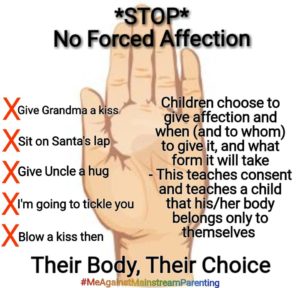The Concept of Self-Ownership Begins At Home
Is there a Libertarian parenting style? Does non-aggression begin in the home? People ask me all the time, as a second generation libertarian, what that must be like. People who are raising their own second generation libertarians ask me how my parents dealt with certain childhood challenges. Is there a way to raise free children?
Let me be the first to say, that the result of a libertarian viewpoint is the tolerance of other choices. That people can choose to live the way they prefer in a libertarian society, as long as they harm no one else. Libertarianism allows for a variety of religious or non-religious views, a variety of lifestyle preferences, and other personal choices.
This extends to the home. The way one makes a family, and the way one raises it. Some parents prefer to unschool, or homeschool, or send their children to professional educators with various teaching philosophies. Some people apply various levels or styles of discipline. They may raise what we call “free range kids”.
Two people I greatly admire for their views on parenting (liberty or otherwise) are Dayna Martin and Roslyn Ross. I recommend their work highly.
I shared a meme on Facebook yesterday that stirred up some controversy. It asked parents to stop forcing their children to show affection. My post led to hundreds of comments and threads of debate. It led me to want to further articulate this concept, because forced affection is something I have concerns about as both a libertarian and as a feminist.
Here’s the meme I shared.

It’s simplistic, and I’m not endorsing the Facebook page that posted it or the rest of their ideas. However it does make the point: forced affection is a problem to bodily autonomy. Their body, their choice. There are many ways people teach children that consent doesn’t matter.
Forced affection is referring to the times someone tells children “give grandma a kiss” or “go hug [insert relative or family friend]”, and if the child doesn’t want to, they make them. This is tremendously common, because everyone wants their children to show the people in their lives that they love them. Affection is an important element of human interaction, particular amongst family and friends.
This also refers to things like tickling. Many children endure playful tickling fights with family or friends – however children sometimes ask for it to stop, and sometimes their pleas are ignored, leading to stress, tantrums, or even trauma.
Many of us who are opposed to forced affection are also opposed to corporal punishment. There is mounting evidence that spanking is ineffective, that it causes long-term harm, and it teaches children to solve problems with violence and aggression.
There are some who believe that “non-violent” parenting is the key to raising children who embrace libertarian philosophy, because they were not shown force in their formative childhood years.
The jury is still out on that, though my bias in favoring the method has a lot to do with the fact that I was raised this way.
When I was four years old, my family went to my father’s office Christmas party, where the Santa Claus was beckoning children to sit on his lap and tell him what they wanted for Christmas. I was a bit shy and not inclined to talk to Santa. Someone asked me if I wanted to go talk to him and I said no. A well-meaning party guest tried to pick me up and place me on Santa’s lap, completely out of the blue and against my will. I struggled and kicked – got poor Santa right in the knee, fell out of their arms, and ran to my brother. I was not punished for this behavior. A stranger had picked me up without my consent and tried to force an interaction. This was a perfectly appropriate reaction.
I loved meeting new people and showing affection when I desired, but it was always initiated by me. It was always my decision whether to touch someone, or to climb up on a grown-up’s lap, or to hug or kiss anyone. My mother might have said “your aunt is leaving, do you want to give her a hug goodbye?” and I’d decide whether to run up and hug her or just wave. I never thought this was strange, until I spotted other parenting methods out in the world.
The reason I find this so significant is because I think it’s important to teach children that they own their own bodies, and as a result, control as much of their own physical circumstances as they are able to at a given point in development – including determining (within reason) who is allowed access to their bodies.
Children are little sponges, taking in the world around them, and they learn from their experiences, what is normal and what is not. If a child feels uncomfortable, say, kissing their uncle, they shouldn’t be made to. However, things like that are often pressured and even forced – which teaches children that their feelings on the matter are invalid, and that they must suppress these feelings of discomfort in order to please others. It also tells them they cannot trust their own feelings about a situation.
A friend of mine on my Facebook thread said this feeling of pressure to give into the preferences of others could very well have made her an easy target for molestation as she would have rationalized that she was being unreasonable to deny someone. She wasn’t molested, thankfully, but she said that the way she was raised indicated to her that she couldn’t assess where the line was between appropriate and inappropriate, since the people around her had always overridden her personal feelings, so she assumed her gut might be wrong, particularly if someone were to tell her “it’s okay”.
This is, of course, one of the dangers in teaching children blind respect of authority figures, and one reason predators of children are sometimes priests, teachers, or family members. Children are often taught to respect and obey them without question, which makes them easier prey for those who would exploit them.
Ultimately, these considerations have led me to maintain my stance against forced affection, and I see things in life and in current events that increase my confidence in my position further.
Now, in feminism, there is a term called “rape culture”, that is often ill-defined in public spaces and makes certain people scoff because they say “everybody hates rapists and wants them to rot in prison, this isn’t a rape culture” (except sometimes). There are even feminist organizations that caution not to overuse the term because they perceive it as shifting blame off the actual rapists. I’ll acknowledge that here in western society, we’ve come a long way from the notion that women were property with no rights over their own destinies. That doesn’t, however, mean there aren’t things within culture to be concerned about.
How many children are socialized to hug or kiss people they don’t feel comfortable with?
How many little girls, for example, learn that their physical comfort or their own bodily preferences are not as important as making someone happy, or doing what’s expected of them? Of course you need to kiss grandma. Don’t you love her?
How many of those little girls grow up and feel obligated to tolerate physical boundary violations?
What about the one who doesn’t want to make a scene screaming “no” at the college party? She has a drink and the guy says he likes her and he wants to talk somewhere quiet and private. They go upstairs. He starts to touch her and she shyly says “we shouldn’t” and she turns her face so he kisses her cheek instead of her lips. She doesn’t want to make him mad.
He keeps going, because he grew up in the same culture, where affection isn’t always enthusiastic, sometimes you just tell someone what is okay, and they go along with it. He wants her. She mutters “no, we should go back downstairs”, but he doesn’t listen, and she thinks it must not matter what she wants. This is normal too for her. She used to tell her mother she didn’t want to kiss her relatives, but her mother told her that her relatives loved her and she must. How could she be cruel and not kiss?
She’s internalized the notion that her body, her own comfort, is not as important as appeasing someone else. She never learned how to set, maintain or control that boundary. She doesn’t trust herself.
She has sex with him that night, pressured, thinking she might as well get it over with, better not to make him sad or angry or disappointed.
She’s talking to her friends a few days later and she mentions she slept with that guy at the party. She wasn’t really into it, but she didn’t want to be a tease. Now she sees him around and it’s so awkward for her. Her friends ask her if she said no. She says she did, but when he didn’t listen, she figured it wasn’t really her choice. He wanted it. It was easier than trying to hold the ground she’s never been allowed to hold before. She’s given up her comfort for others all her life.
Her friend tells her it was rape. If she said no, and he had sex with her anyway, it’s rape.
They bring her to campus police. She’s questioned about how much she drank that night. Why didn’t she fight him off? Why didn’t she try to get away? Maybe she really wanted it, if she didn’t fight that hard. Her friends rally to her defense. They tell her he’s not allowed to just have her body just because he wants it. She wakes up to the idea that her body isn’t just an object for others to violate without her consent, but she’s learned it too late. She becomes bitter over all the violations she remembers. The memories haunt her constantly.
He wakes up to find out he’s been accused of rape. Some people stand by him, but there’s an increasing crowd of people calling him “the rapist” on campus, regardless of whether or not it ever goes to trial or he’s ever convicted. He says he thought she was into it. It’s all he said/she said. The accusation haunts him, academically, personally, professionally.
Nobody wins. Everybody loses.
She never knew this boundary was hers to claim, was hers to maintain. He didn’t know she wasn’t okay with it. He was used to people pressuring affection. It was always okay to force him to kiss his grandparent. This is normal. This is how the world is.
I don’t care what you want to call it. “Rape culture” has its baggage and I acknowledge that.

There’s a culture that allows these violations, from childhood on. There’s a counter to that culture in the way that I was raised. A way that doesn’t force affection.
I think back to every interaction with someone where I was uncomfortable and I realize how many times I got myself out of situations other women find themselves feeling trapped in. I was raised with the self esteem and self confidence to stand up against what I wasn’t comfortable with. I was raised with the idea that my comfort matters, and it’s okay to disappoint someone if I don’t feel okay with what’s happening. Of course I was also raised not to be rude, but I was raised to prioritize myself in a way that I think has helped prevent people from pushing my boundaries, or getting past them against my will.
But the culture I see around me, fostered by so many well-meaning individuals who just want their kids to do what they’re told and be polite and not hurt others’ feelings… I see it violating boundaries, I see it teaching children that they don’t own themselves, and that they aren’t allowed to set, maintain, and defend their own boundaries. I see it giving predators opportunities, and I see it harming our capacity to defend ourselves from the claims that what we should do is give in, submit, accept oppression or taxation or police brutality. That we should expect to not own ourselves.
I don’t want to say that there’s One True Libertarian parenting style. I’m not even a parent, so plenty of people think I’m disqualified from having an opinion, despite the fact that I have been a child and well aware of my own mind, desires, and agency. I’ve also been a nanny to an incredibly self-possessed child I am honored to still influence as she grows.
But I am a libertarian, and I do think that the way I was raised makes my understanding of the principles of self-ownership and non-aggression tremendously engrained in how I reflect on the world, and how I advocate for liberty. How I advocate for myself. How I advocate for others.
I ask anyone who is parenting, or considering parenting, to look at the ways they pressure children or force children. Look at the ways they tell children that they do not own themselves, that they are not responsible for their own bodies, and they are not the best judge of what is okay for them.
How many people take this concept into adulthood? That they are not fit to determine their own lives? That they cannot? That they must rely on their parent, or, when they’ve left the nest, their government?
Self-ownership begins at home.




2 comments
… [Trackback]
[…] Read More on that Topic: thelibertarianrepublic.com/childhood-self-ownership-is-there-a-libertarian-way-to-parent/ […]
… [Trackback]
[…] Find More on that Topic: thelibertarianrepublic.com/childhood-self-ownership-is-there-a-libertarian-way-to-parent/ […]